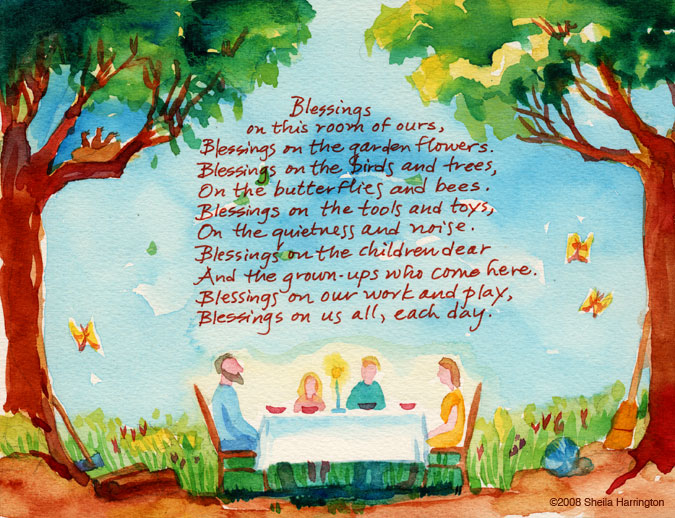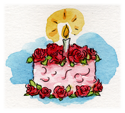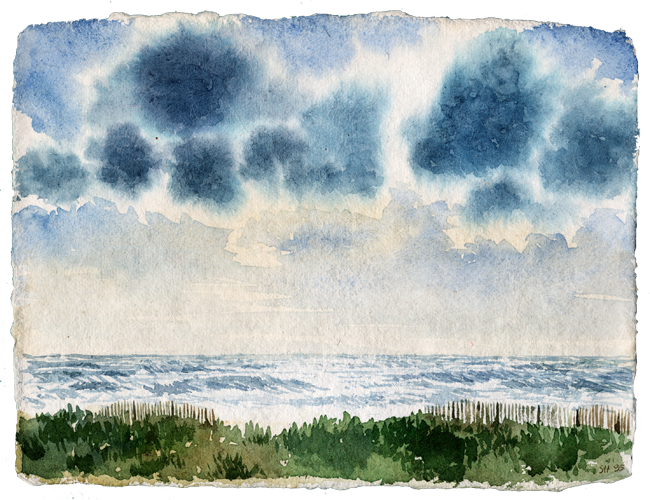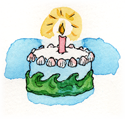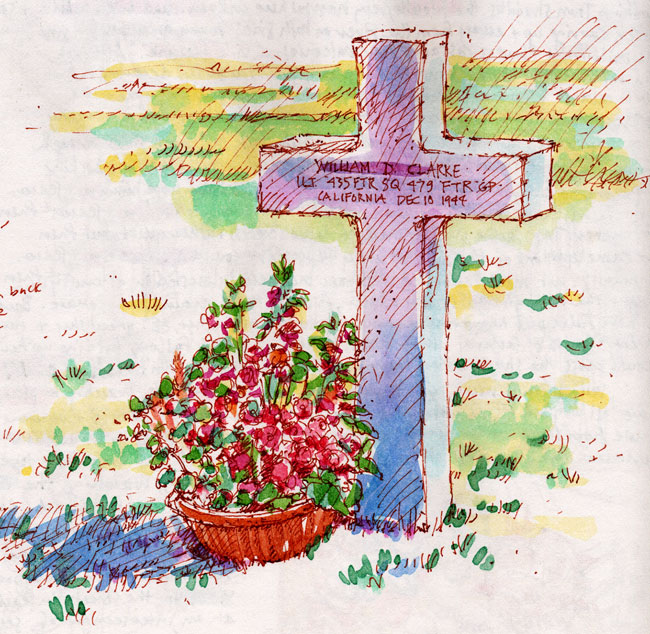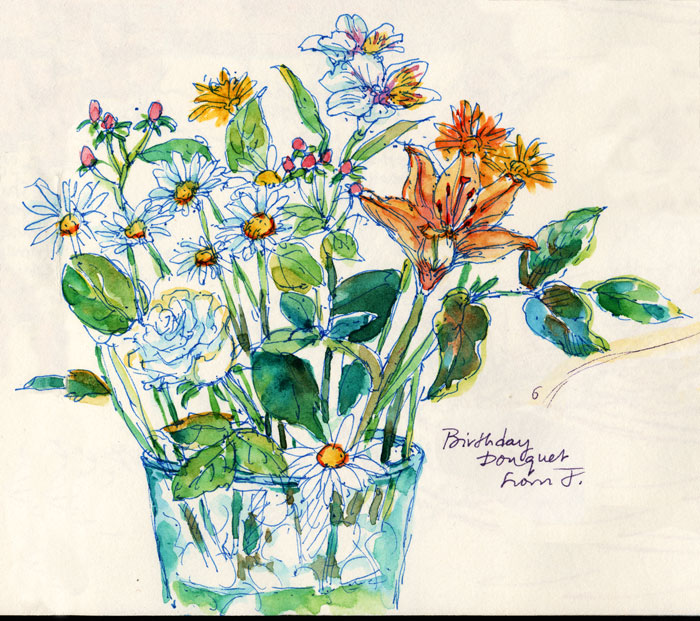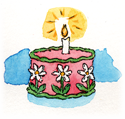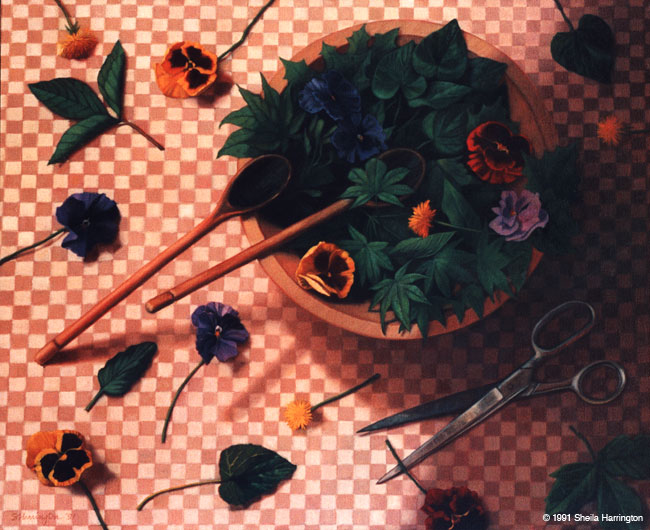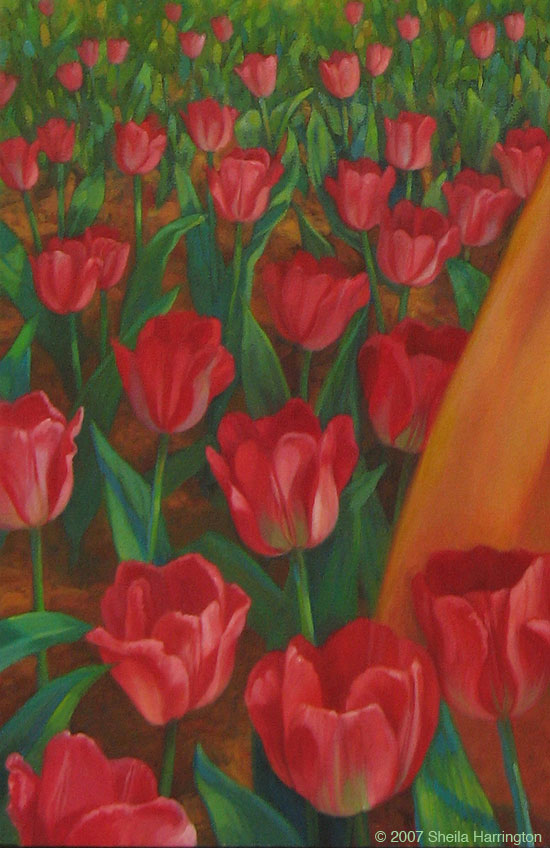From our family verse book. One of my favorite things about mild weather is dining outside. We do it whenever we can, even if it just means downing a bowl of cereal on the front porch while waving to the neighbors heading off on their morning missions. Although I do love a tablecloth, and candles. And I haven’t yet found the right wine for oat flakes.
Tag: Poetry
Rites of Passage
From my sketchbook. It’s the season of graduations, and weddings, and the perpetual hankie in the hand and lump in the throat.
In her room at the prow of the house Where light breaks, and the windows are tossed with linden, My daughter is writing a story.I pause in the stairwell, hearing From her shut door a commotion of typewriter-keys Like a chain hauled over a gunwale.
Young as she is, the stuff Of her life is a great cargo, and some of it heavy: I wish her a lucky passage.
But now it is she who pauses, As if to reject my thought and its easy figure. A stillness greatens, in which
The whole house seems to be thinking, And then she is at it again with a bunched clamor Of strokes, and again is silent.
I remember the dazed starling Which was trapped in that very room, two years ago; How we stole in, lifted a sash
And retreated, not to affright it; And how for a helpless hour, through the crack of the door, We watched the sleek, wild, dark
And iridescent creature Batter against the brilliance, drop like a glove To the hard floor, or the desk-top,
And wait then, humped and bloody, For the wits to try it again; and how our spirits Rose when, suddenly sure,
It lifted off from a chair-back, Beating a smooth course for the right window And clearing the sill of the world.
It is always a matter, my darling, Of life or death, as I had forgotten. I wish What I wished you before, but harder.
—Richard Wilbur
Sea Fever
I must go down to the seas again, for the call of the running tide Is a wild call and a clear call that may not be denied; And all I ask is a windy day with the white clouds flying, And the flung spray and the blown spume, and the sea-gulls crying.
I must go down to the seas again, to the vagrant gypsy life, To the gull’s way and the whale’s way, where the wind’s like a whetted knife; And all I ask is a merry yarn from a laughing fellow-rover, And quiet sleep and a sweet dream when the long trick’s over.
—John Masefield
My mother shared with my husband a deep love of sailing ships and the sea, as well as sea-related poetry and books. They discovered together and passed back and forth the entire Patrick O’Brien series, set aboard ship during the Napoleonic Wars. (My mother was convinced she had been a cabin boy in some past life and had drowned off the White Horse Reef.)
At her memorial service, my dear husband, never one to stand up and speak before a crowd, decided to read aloud in my mother’s honor this poignant and evocative poem they both love, written by John Masefield (1878-1967), whose birthday it is today. For me now my mother and my husband are forever within its lines.
Memorial Day
—William Butler Yeats
 Ariel and Sam
Ariel and Sam
Last Glimpse of Erin
In honor of his birthday today, a poem by Thomas Moore (1779-1852), and a painting.
Though the last glimpse of Erin with sorrow I see, Yet wherever thou art shall seem Erin to me; In exile thy bosom shall still be my home, And thine eyes make my climate wherever we roam.To the gloom of some desert or cold rocky shore, Where the eye of the stranger can haunt us no more, I will fly with my Coulin, and think the rough wind Less rude than the foes we leave frowning behind.
And I’ll gaze on thy gold hair as graceful it wreathes, And hang o’er thy soft harp, as wildly it breathes; Nor dread that the cold-hearted Saxon will tear One chord from that harp, or one lock from that hair.
—Thomas Moore aa aa
 Kristen
Kristen
To Ellen, At The South
A May bouquet from my sketchbook.
Ellen, a poet herself, shares a birthday with Ralph Waldo Emerson (1803-1882) so it seemed appropriate to post this poem for the two of them today. Except that Ellen is actually At The North.
To Ellen, At The South
The green grass is growing,
The morning wind is in it,
‘Tis a tune worth the knowing,
Though it change every minute.
‘Tis a tune of the spring,
Every year plays it over,
To the robin on the wing,
To the pausing lover.
O’er ten thousand thousand acres
Goes light the nimble zephyr,
The flowers, tiny feet of shakers,
Worship him ever.
Hark to the winning sound!
They summon thee, dearest, Saying;
“We have drest for thee the ground,
Nor yet thou appearest.
“O hasten, ‘tis our time,
Ere yet the red summer
Scorch our delicate prime,
Loved of bee, the tawny hummer.
“O pride of thy race!
Sad in sooth it were to ours,
If our brief tribe miss thy face,—
We pour New England flowers.
“Fairest! choose the fairest members
Of our lithe society;
June’s glories and September’s
Show our love and piety.
“Thou shalt command us all,
April’s cowslip, summer’s clover
To the gentian in the fall,
Blue-eyed pet of blue-eyed lover.
“O come, then, quickly come,
We are budding, we are blowing,
And the wind which we perfume
Sings a tune that’s worth thy knowing.”
—Ralph Waldo Emerson
(Maybe by this time next year I can find one for Jeannie.)
Mothers Day
Flowers, and a poem, for Mothers Day.
The Lanyard
The other day I was ricocheting slowly
off the blue walls of this room,
moving as if underwater from typewriter to piano,
from bookshelf to an envelope lying on the floor,
when I found myself in the L section of the dictionary
where my eyes fell upon the word lanyard.
No cookie nibbled by a French novelist
could send one into the past more suddenly—
a past where I sat at a workbench at a camp
by a deep Adirondack lake
learning how to braid long thin plastic strips
into a lanyard, a gift for my mother.
I had never seen anyone use a lanyard
or wear one, if that’s what you did with them,
but that did not keep me from crossing
strand over strand again and again
until I had made a boxy
red and white lanyard for my mother.
She gave me life and milk from her breasts,
and I gave her a lanyard.
She nursed me in many a sickroom,
lifted spoons of medicine to my lips,
laid cold face-cloths on my forehead,
and then led me out into the airy light
and taught me to walk and swim,
and I, in turn, presented her with a lanyard.
Here are thousands of meals, she said,
and here is clothing and a good education.
And here is your lanyard, I replied,
which I made with a little help from a counselor.
Here is a breathing body and a beating heart,
strong legs, bones and teeth,
and two clear eyes to read the world, she whispered,
and here, I said, is the lanyard I made at camp.
And here, I wish to say to her now,
is a smaller gift—not the worn truth
that you can never repay your mother,
but the rueful admission that when she took
the two-tone lanyard from my hand,
I was as sure as a boy could be
that this useless, worthless thing I wove
out of boredom would be enough to make us even.
—Billy Collins
Come, Lovely May
Here are the lovely grounds of the neighborhood Marriott Wardman Park hotel before they cut down most of the trees. Sigh. My daughter was skipping along, filling a basket with fallen blossoms.
Come, lovely May, with blossoms
And boughs of tender green,
And lead me over the meadows
Where cowslips first were seen.
For now I long to welcome
The radiant flowers of spring,
And through the wild woods wander,
And hear the sweet birds sing.
—Traditional
Spring Salad
The First Green of Spring
Out walking in the swamp picking cowslip, marsh marigold,
this sweet first green of spring. Now sautéed in a pan melting
to a deeper green than ever they were alive, this green, this life,
harbinger of things to come. Now we sit at the table munching
on this message from the dawn which says we and the world
are alive again today, and this is the world’s birthday. And
even though we know we are growing old, we are dying, we
will never be young again, we also know we’re still right here
now, today, and, my oh my! don’t these greens taste good.
—David Budbill
Garden at the heart
We are seeing the last of the tulips here. (This is a detail from a larger painting.)
There is a garden at the heart of things,
Our oldest memory guards it with her strong will.
Those who by love and work attain there
Bathe in her living waters, lift up their hearts and
Turn again to share the steep privations of the hill;
They walk in the market but their feet are still.
from The Promised Garden, by Theo Dorgan

